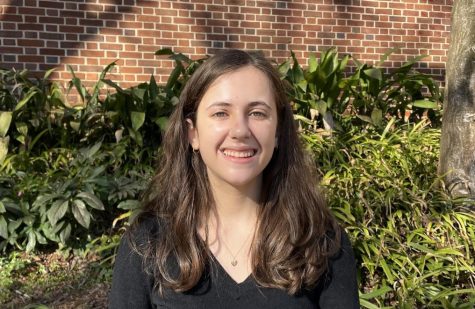Panel shows diverse views on Grady name change
Panelists discuss the potential name change with moderator journalist Donna Lowry, held on Friday, August 21.
August 23, 2020
A diverse group of panelists discussed Henry W. Grady’s history and issues to consider as the Atlanta school board moves later this year to rename the school that bears his name.
The Aug. 21 meeting was designed to allow community involvement in the renaming process, which started in July with the convening of a renaming committee and virtual meetings. Many students and community members have advocated for renaming the school based on the controversial actions of its namesake, Henry Woodfin Grady.
“He [Henry W. Grady] was firmly in between the Civil War South and the Jim Crow South. In those years that are roughly from the 1860s to the 1900s, that was an odd time,” said the great-great-grandson of Henry Grady, Henry Grady III. “It was a different time in the South, and we need to understand that.”
Grady III said he felt a sense of pride seeing his family name around Atlanta while growing up. Journalist and Class of 1959 alum William Hedgepeth also is proud of the school’s namesake and the success of his high school. Hedgepeth is a part of a group of alumni opposing the name change.
“Grady High School has a reputation as one of the best high schools in the country,” Hedgepeth said. “There’s a certain pride to be taken having graduated from Grady.”
Georgia Public Broadcasting journalist Donna Lowry moderated the panel, which consisted of Neil Williams, Grady’s first Black valedictorian, and Howard Graves, analyst at the Southern Poverty Law Center, along with Hedgepeth and Grady III.
Lowry asked the panel to explore the topic of “remembrance vs. reverence” in relation to the school’s name. Williams, who has supported a name change expressed that who society reveres changes over time, and it’s a fair discussion for this generation to have.
“Only in the last 20 to 30 years are we coming to grips with the vestiges of the Lost Cause,” Williams said. “I think renaming institutions is one way to go about erasing that history.”
The “Lost Cause” refers to the idea embraced by those who believe that the Confederacy fought for noble and heroic reasons.
Graves explained the importance of considering whose stories have been told when looking at history.
“Who has the ability to make their way forward and for their posterity to be able to see themselves as represented within society and in what they leave behind?” said Graves, who is White. “For a long time, it’s been people with deep roots in the South who happen to look like me, Mr. Grady III, Mr. Hedgepeth, and I welcome the conversation of whose story needs to be told.”
The meeting was then opened for public comment, and Social Studies teacher Chris Rhodenbaugh described his own experience while researching this topic.
“I often hear Grady’s positions defended as ‘He was a man of the time. We’re revering his commitment to Atlanta, not his views on race’,’” Rhodenbaugh said. “But the deeper I am researching this to prepare to teach my students about this in the first few weeks of class, I keep coming across the fact that Grady was put in a position of authority when asked about racial issues in the South.”
Class of 2000 alumna Rahwa Tassaw, who pushed for the name change, co-organized two meetings (the first on Aug. 17), with the intention of creating a constructive dialogue regarding a divisive topic. Royce Mann, Class of 2020 graduate, who also pushed for the name change, worked with her to provide an opportunity for community input. After the meeting, attendees were placed randomly into breakout rooms for additional discourse.
“I’m always in favor of dialogue and discourse,” Tassaw said. “I think it’s important in any issue.”
Grady owned the Atlanta Herald and was part owner of the Atlanta Constitution, and he died in 1889 at age 39. He is known for making great progress in journalism and bringing industry to the South. While Grady made many positive contributions, he was also a supporter of segregation and many of his ideas aligned with those of white supremacists, according to Kathy Roberts Forde, Associate Professor of Journalism at University of Massachusetts Amherst.
The meeting created an opportunity for constructive dialogue and potential compromise. Grady III, Hedgepeth and Williams all showed support for a hyphenated name, but the Renaming Committee has indicated that they will not submit this request to the Board of Education. As part of the discussion, Grady III showed an openness to change.
“I would very much like to see Grady High School revered as a school under a name that is right for today,” Grady III said. “If the right name for today connects the past to the present, so be it. If the right name for today is a different name, so be it, but it doesn’t change the past.”







